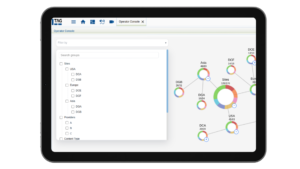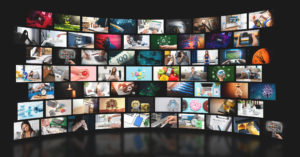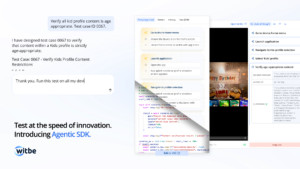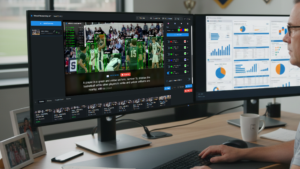EditShare – Will AI really transform the media industry?

Stephen Tallamy, EditShare
Unless you are a hermit, you cannot fail to have noticed all the talk about AI at the moment. It is everywhere.
If you believe the hype, then we are all doomed. The machines are ready to take over, and there will be no need for any human to do any work ever again. We are all rather more cynical than that, and we know deep down that we can probably hang on to our jobs at least for a while.
For a long time now, we have known one fundamental thing about computers. They are good at dull, repetitive tasks, while people are good at creative tasks. And, despite the reports in the popular press, AI largely conforms to that rule.
Ask an AI system to create a new popular drama series and it will look at all the popular drama series in the past and conclude that to succeed a drama must include a police officer with one significant character flaw, who has a sidekick to which everything must be explained. It might make a valiant attempt at a pilot script for such a drama, but it will not be original and it probably will not be a hit.
But I am certainly not saying there is no place for AI in our industry. In fact, I can already see a lot of places where it will be of value, where it will take the load off people, providing the support we have never had before to allow us to concentrate on creativity.

Imagine you are making a programme. It might be a documentary, or maybe a nature programme. You have a mix of new shoots and archive footage. You want the final result to look as seamless as possible.
The issues are obvious. Your new shoot will use your camera of choice, and you will apply the best LUT to get the color balance you want to tell the story. The archive footage, though, will be in a mix of frame rates – 24, 25, 29.97 – and probably wildly varying color balance.
Getting the smoothest results from frame rate conversion takes some time. Matching colors is potentially a long – and not very creative – job for a skilled colorist. So here are two ideal applications for intelligent systems: not just make all the footage run at the right speed with legal colors, but analyze the content and match things up as near perfectly as possible.
That seems to me to be the right balance. If you are an editor, you should be focusing on telling the story in the best way possible, not worrying about color science. Once the story is in place, you can do a final pass to smooth off anything that is not perfect and hand it to a colorist to bring creative color choices to set the tone and atmosphere to enhance the experience.
Another application is the one that comes up most often when people talk about AI in media workflows: logging and tagging. Making a good speech-to-text transcript is very valuable, especially in the newsroom where the archive now has word-for-word metadata of every shot in the library.
Analyzing images is also a good way to add to metadata, and actually the way a machine does it is very different to the way that the journalist or archivist would tag content. Despite the name, AI does not actually have intelligence: it looks at a piece of content and tries to recognise everything on screen. So it will note everything that happens, not just what a human operator considers “important” or “relevant”.
We all know about the psychology experiment where you are shown a video clip of people passing a basketball around. Asked afterwards, people might recall the number of passes, but supposedly no one notices the gorilla running through the scene. The AI logger would.

Taking a step back, it’s possible to see that AI would be useful in planning and organizing a project. It would get to learn how the facility and the editor works, and try to predict what is happening in the workflow. It might well spot what it considers bad practice, but it should learn that is the way things are done around here and provide the right resources at the right time.
Again, this may not have much impact on a one-off, high-end drama. But if you are working on a bulk order of, say, a daily game show, it would speed things up to have an AI assistant lining up all the strings and transitions you need at the moment you need them. It could give you the time to spot the interesting reactions that lift the individual performance out of the ordinary.
What is my take-home on AI? Yes, it is powerful and could make life easier, smoother and more productive. Embracing AI to take away the laborious tasks and unlock more creativity, as well as satisfy the ever-increasing demands of creating more content quicker. Creativity is an act of humanity and audiences quickly become tired of anything artificial. So embrace human collaboration, just aid it with AI.









